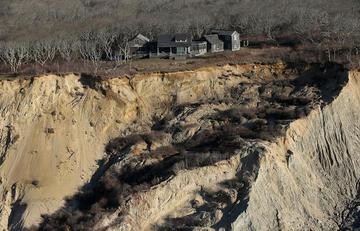Who is afraid of Sea Level rise?
Globe CorrespondentThe scenes of Hurricane Sandy rampaging through New York City last October stunned city planners on the East Coast, posing a question of whether to withdraw from the waterfront.“It was, oh my god, it can happen here, too,” mused Brian Swett, Boston’s environmental director.
New York Gov. Andrew Cuomo has proposed using $400 million to buy beachfront homes and raze the buildings, leaving beach buffers from the sea.
Not Boston. The rapidly rising sea levels and prospects for more violent storms have not diminished the city’s appetite for developing its waterfront.
“No one is saying ‘retreat,’” said Vivian Li, president of the Boston Harbor Association. Her association completed a report in February that illustrated in sobering detail the double-whammy of higher seas and fierce storms.
Had Sandy hit Boston five hours earlier, at high tide, six percent of Boston would have flooded. In 2050, with the sea level expected to be as much as 2.5 feet higher from climate change, a Sandy-like storm at high tide would flood 30 percent of the city, the report showed.
Rather than shy from building on the waterfront, however, developers are calculating how they can adapt to floodwaters, Li said in an interview in her office.
“Even after Sandy, even after our report, there hasn’t been an impact on property value. The cranes cannot move faster here,” Li said. “They are going to develop areas that are clearly vulnerable, and they are going to adapt.”
“We have ten million square feet of real estate development right here in the innovation district,” said Swett, an in interview at City Hall. Buildings can be constructed several feet higher, ground floors can be designed to expect flooding, crucial systems like electricity and air conditioning can be put on roofs instead of basements, ground-level windows can be shuttered and upper windows opened, he said.
“Our waterfront is relatively less developed” than some other cities, Swett said. Until the Big Dig replaced I-93 in 2005, the elevated highway had isolated the waterfront and discouraged development. Now, he said, developers have a chance to do it right.
“I think we have the opportunity in Boston to be the most climate-resilient city in the country,” Swett said. “We know better what to do than cities that developed ten of 15 years ago.”
The property owners “are not in denial,” Li added. “They are not saying there is no risk. They are saying we can adapt.”
One of those developers, Joseph Fallon, explained on a recent WCVB “Chronicle” program how he will adapt to climate change while building a massive hotel-condo-marina project at Fan Pier on Boston’s Seaport.
“We’ll raise the grade 12 to 18 inches, and then we will raise the lobby floor. So we are starting to add feet. Everything we do we start above what the normal elevation would have been 100 years ago when they were building down here.”
“I think we are on the right track,” Swett said. “I will never be able to check the box and say we are prepared for climate change. It’s an ever-changing perspective. All we can do is say we are more prepared than last year.”


